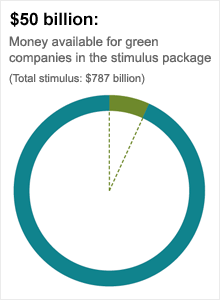Green gift: Energy upstarts chase stimulus cash
With help from Washington, a new crop of entrepreneurs are building pragmatic, planet-friendly enterprises.


(Fortune Small Business) -- There were no champagne corks popping at Horizon Wind on the February morning when President Obama signed the $787 billion American Recovery and Reinvestment Act into law. Instead, 30 employees swilled coffee as they got down to work in the Houston energy startup's conference room. The emergency meeting reviewed the company's pipeline and decided to move a number of projects from Tier 2 (promising but on the back burner) to Tier 1 (funding), thanks to the stimulus plan's $50 billion in clean energy provisions.
"This is a big opportunity," says COO Gabriel Alonso. "We're all very excited."
Half a continent away, another clean energy executive was already reaching for the phone. Chris King, chief strategy officer of eMeter, a San Mateo, Calif. company that makes software for the electric grid, was delighted by the bill's $11 billion allocation for businesses like his.
"We started calling our investors and prospective clients again," says King. "The funds will accelerate some projects and make the business case compelling in others, doubling our U.S. business this year."
The fragile renewable energy economy is dominated by small firms, and for some of them the stimulus arrived in the nick of time. Last October's credit market crisis was an especially rude shock for a sector that had grown fat on six straight years of record investment growth. Even now, few in the industry doubt that a great green shakeout is under way.
"Everyone is in survival mode," says Brian Fan, senior research director at the Cleantech Group, a trade organization in San Francisco.
For renewable energy companies, the recession couldn't have come at a worse time: They were just starting to see returns on their investments. From 2002 to 2008, according to Ernst & Young, private investment in clean technology grew by 65% a year, reaching $4.7 billion last year. The U.S. wind industry installed a record 8,400 megawatts of energy capacity in 2008, enough to serve 2 million homes. Solar panel installations doubled last year. But the number of new green energy installations is almost certain to plummet in 2009.
The stimulus package did hit a number of sweet spots. Among them: $8 billion in loan guarantees for innovative technology; a three-year, $13 billion extension of a tax credit on clean energy production; a new investment tax credit; and plenty of work for small contractors to make government buildings and housing projects energy efficient.
"Overall the bill gets high marks," says Rona Fried, president of SustainableBusiness.com, a green news site. "It covers the universe of components that are needed to support green energy in a significant way."
The question is whether this support is too little, too late. For every Horizon Wind or eMeter that saw an immediate uptick in business, there are small companies for which recovery still looks like a mirage at the far end of a desert.
DMI Industries, a Fargo, N.D. company that builds towers for wind turbines, reduced its workforce by 20% as the stimulus bill was being debated. The company figures it will take months for its customers to start calling again.
OptiSolar, a leading developer of solar panel farms in Hayward, Calif., was supposed to build a whopping 550-megawatt facility for Pacific Gas & Electric - but couldn't get production going without the $300 million in loan guarantees it had requested from the government. (In March, OptiSolar sold its project pipeline to a rival for $400 million in stock.)
In theory, the stimulus bill's $8 billion in loan guarantees should help. But such guarantees have been available since 2005, when Congress passed the Energy Policy Act. Not one has actually made its way to a company. The review process is slow, and the up-front fees are steep.
"It's been a black hole," complains George Sterzinger, executive director of the Renewable Energy Policy Project. It remains to be seen whether the Obama administration can fix this broken process.
In the short term the stimulus bill's tax credits are likely to be more useful than loan guarantees. First, double-dipping is now encouraged: Green companies can gorge on both state and federal tax credits instead of being forced to choose. Second, even green startups with no profits to write taxes off against will receive an IRS check for the maximum refund.
Clean energy businesses get a nice gift in the form of a 30% tax credit on investment to encourage expansion in the U.S. (rather than overseas, where 90% of all clean energy manufacturing now takes place). Solar technology company Heliovolt, based in Austin, plans to do just that.
"We are in a position to double the capacity of our factory," says founder B.J. Stanbery. "The program gives us leverage to tell investors, 'This reduces your risk.' "
Then there's the $11 billion earmarked for expanding and upgrading the nation's electric grid, a boon for small "smart grid" players such as eMeter and Tendril. This money is meant to fund 3,000 miles of new high-voltage transmission lines, to help wind and solar farms in the Plains States and Southwest reach the cities that need their power and to computerize the entire grid for maximum efficiency.
Done right, the smart grid could do for clean energy what the interstate highway system did for autos. But John Wellinghoff, acting chairman of the Federal Energy Regulatory Commission, recently told reporters that a true smart grid would cost $200 billion. He described the stimulus package's $11 billion provision as "seed money."
It's a good analogy for the clean tech stimulus: seeds that may one day generate green shoots, but only after a long, difficult winter. ![]()
-
The Cheesecake Factory created smaller portions to survive the downturn. Play
-
A breeder of award-winning marijuana seeds is following the money and heading to the U.S. More
-
Most small businesses die within five years, but Amish businesses have a survival rate north of 90%. More
-
The 10 most popular franchise brands over the past decade -- and their failure rates. More
-
These firms are the last left in America making iconic products now in their twilight. More












